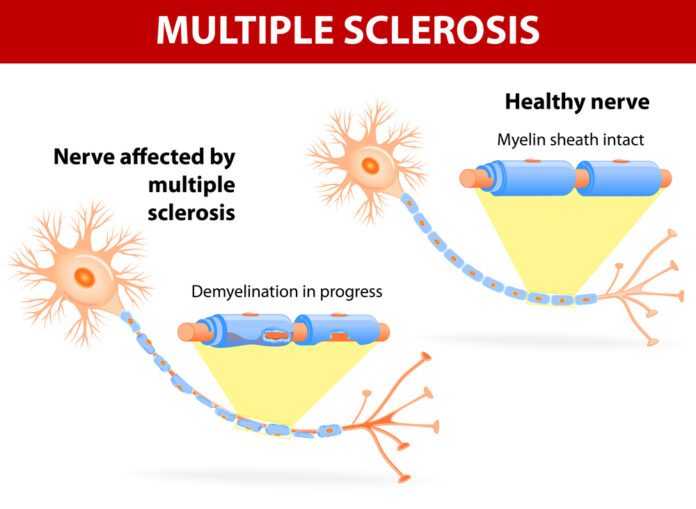Multiple sclerosis (MS) is an inflammatory disease of the nerves. The disease affects the myelin of the nerves in the brain and spinal cord. Myelin is the insulating covering of the nerves that protects their form and function. Made of proteins and fats, the myelin sheath allows for an efficient and speedy relay of electrical impulses.
In multiple sclerosis, the myelin sheath gets damaged. As a result, the electrical impulses are unable to fire across the bare nerves. Depending on the extent of damage, there may be no or slow passage of nerve impulses. One can well imagine what happens when there is a failure of nerve impulse transmission – There is no communication between your brain and the rest of your body. Sooner or later, the disease can cause permanent damage to the nerves.
Patients may present with a range of signs and symptoms. The severe form of the disease may altogether disable a person. In contrast, a less severe condition of MS exhibits long periods of remission alternating with disability.
Many epidemiological studies indicate that in the U.S. alone, there are 200 cases reported every week. About 400,000 people suffer from MS in the United States. That huge prevalence has made MS an active research topic.
So what causes MS? Is the disease curable or treatable? What treatment gives you the safest bet against MS?
The Causative Factors Of Multiple Sclerosis
Multiple sclerosis is most often described as an autoimmune disease. An autoimmune disease is one in which the body’s intrinsic immune system destroys the myelin sheath’s structural elements. However, there is a lack of evidence supporting this theory. However, the remission stage of MS presents signs and symptoms mediated by the immune system. Yet, the condition does not meet the criteria of an autoimmune disease set by researchers. Most of the research studies concluded with conflicting results.
On the other hand, MS shares a strong link with inflammation. Many studies have come up with serological (the study of antibodies in the blood) and pathological (the study of disease-cause in tissue samples) evidence defining MS as an inflammatory demyelinating disease. Imaging and genetic proof also support this concept.
All in all, researchers hold the following factors as playing a part in the development of MS:
- Genetic predisposition
- Environmental effects
- Development of immune-mediated response to an antigen
Treatment Protocol Of Multiple Sclerosis
Multiple Sclerosis most often starts between the ages of 20 and 40 years. However, it spares no age as the disease also affects children and individuals aged above 60 years.
MS is twice more prevalent in women than in men. It is the leading cause of non-traumatic disability among young adults.
Unfortunately, MS has no cure. However, the signs and symptoms are manageable. There are options available to slow the progression of the disease. And different therapies help speedy recovery from an MS attack. Here are three modules for managing multiple sclerosis:
1. Symptomatic treatment of MS
Corticosteroids remain the first line of treatment when an attack of MS ensues. Administering either oral (prednisolone) or intravenous (methylprednisolone) corticosteroid therapy is beneficial.
Doctors suggest plasma exchange If the patient fails to respond to corticosteroid therapy. The liquid portion of some part of the patient’s blood (plasma) is removed. The blood cells are sifted from the liquid part and mixed with albumin (protein) solution. The protein and blood cell solution is transfused back into the patient’s body.
Both of these therapies aim at decreasing the nerve inflammation of an MS attack.
2. Treatment to speed up recovery
Multiple remedies help in speedy recovery from an attack of MS. These include:
- Muscle relaxants to improve the muscle spasms or stiffness associated with MS
- Medicine for relieving stress and fatigue
- Drugs to improve walking
- Physical therapy
- Supporting medicines for pain, depression, insomnia, weak bladder or bowel, sexual dysfunction
3. Keeping a check on disease progression
MS takes two routes. A primary progressive stage or relapsing-remitting multiple sclerosis.
The drug ocrelizumab (Ocrevus) is the only disease-modifying therapy (DMT) approved by the FDA for both the primary progressive or relapsing-remitting MS. Given as intravenous infusion, it reduces the relapse rate and slows disability in patients with MS.
For the relapsing mode, an intensive treatment applied as early as possible helps the patient. As mentioned earlier, the body’s immune response is much more in the disease’s early stages. So treating MS, in the beginning, helps to cut back the relapse rate, slow the formation of nerve lesions, reduce the risk of brain weakening and any other potential disability.
Oral and injectable medications cater to the relapsing stage.
An infusion of Natalizumab (Tysabri) and Alemtuzumab (Campath, Lemtrada) benefits the severe forms of the disease. Only a registered medical practitioner can deliver the infusions for MS. Patients receiving the infusion follow a strict and vigilant dosage schedule. In addition to the conventional therapeutic modes, some other support measures also help.
4. Home-based remedies. These include:
- A healthy diet
- Rest
- Stress alleviation
- Specific exercises
- Keeping the body temperature down
5. Alternative therapies
- Meditation
- Yoga
- Massage therapies
- Acupuncture
- Other relaxing techniques
- Vitamin D supplementation
- Oral cannabis extract
The research regarding the possible role of oral cannabis capsules in managing MS is still in infancy. The evidence is encouraging when it comes to relieving the muscle spasms and pain associated with MS.
Vitamin D supplementation helps decrease the risk of MS. Research shows the benefits of sun exposure and vitamin D intake in this regard.
Multiple sclerosis is a debilitating yet manageable disease. Thanks to conventional medicine, many remedial solutions cater to reduce the risk and progression of the disease.





